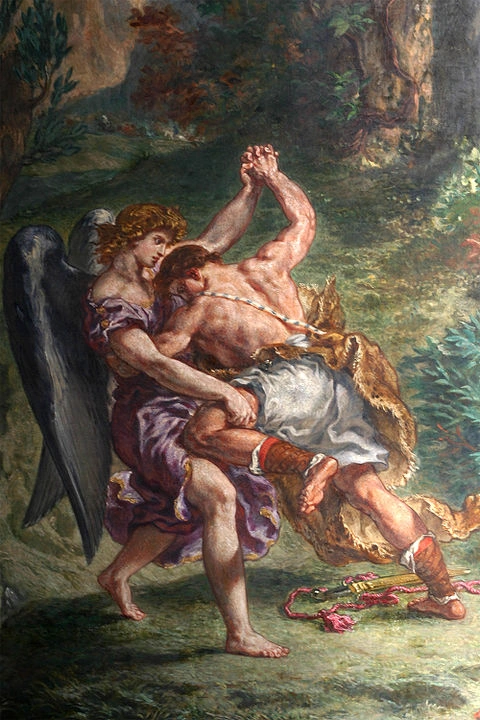4281. 'The hollow of Jacob's thigh was out of joint as he wrestled with him' means that in the descendants of Jacob that conjunction had been thoroughly damaged and the two loves pulled apart. This becomes clear from the meaning of 'wrestling' in this sense as being pulled apart and so suffering damage. It is evident from what has been stated above in 4280 that 'the hollow of the thigh' means a joining together; and that 'Jacob' in the Word means not only Jacob but also all his descendants is clear from very many places, such as Numbers 23:7, 10, 21, 23; 24:5, 17, 19; Deuteronomy 33:10; Isaiah 40:27; 43:1, 22; 44:1-2, 21; 48:12; 59:20; Jeremiah 10:16, 25; 30:7, 10, 18; 31:7, 11; 46:27-28; Hosea 10:11; Amos 7:2; Micah 2:12; 3:8; Psalms 14:7; 24:6; 59:13; 78:5; 99:4; and in other places.
[2] Jacob and his descendants were by nature such that with them celestial and spiritual love could not be joined to natural good, that is, the internal or spiritual man could not be joined to the external or natural man. This is evident from the details told in the Word concerning that nation. For they neither knew nor wished to know what the internal or spiritual man was, and therefore that matter was not revealed to them. In fact it was their belief that nothing existed with man apart from the external and natural. Nor in all their worship did they have anything else in mind, so that Divine worship with them was wholly idolatrous; for once internal worship is separated from external, it is nothing but idolatrous. The Church which was established among them was not in fact a Church but only a representative of the Church, for which reason that Church is called a representative Church. For it was possible for a representative of the Church to exist among such people, see 1361, 3670, 4208.
[3] Indeed in representations no attention is paid to the person who represents, only to the thing represented by him. Consequently not only persons represented Divine, celestial, or spiritual things, but also inanimate objects, such as Aaron's garments, the ark, the altar, the oxen and sheep which used to be sacrificed, the lampstand with its lamps, the bread of the presence on the table of gold, the oil with which they were anointed, the frankincense, and other objects like these. This was why their kings, bad ones no less than the good, represented the Lord's kingship, and why their high priests, bad ones no less than the good, represented the things that belong to the Lord's Divine priesthood, when they performed their own function in external form according to the prescribed rules and commands. In order therefore that among them a representative of the Church might come into existence they were provided through plainly visible revelation with such prescribed rules and such laws as would be entirely representative. Therefore as long as they kept to them and strictly complied with them, those people were able to play a representative role. But when they deviated from them into the prescribed rules and laws of other nations, and in particular to the worship of another god, they deprived themselves of their ability to play that representative role. For this reason they were coerced by external means - which were captivities, calamities, threats, and miracles - into obeying laws and prescribed rules that were truly representative, not by internal means, as those people are whose external worship has internal within it. These are the considerations that are meant in the internal historical sense by the words 'the hollow of Jacob's thigh was out of joint', which sense has regard to Jacob and his descendants.







